 W
WThe Blind Giant is Dancing is a play by Australian playwright Stephen Sewell. It went on to win the 1985 New South Wales Premier's Literary Award.
 W
WChikubushima is an anonymous Noh play of the first category, celebrating the sacred volcanic island of that name in Lake Biwa.
 W
WCleone is a 1758 tragedy by the British writer Robert Dodsley.
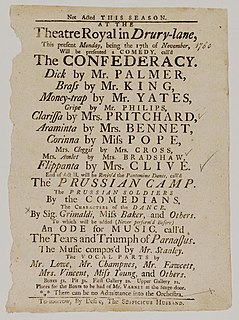 W
WThe Confederacy is a 1705 comedy play by the English writer John Vanbrugh. It is also known as The City Wives' Confederacy. The plot was inspired by a 1692 farce by the French writer Florent Carton Dancourt. Two years before Vanbrugh's work, another writer Richard Estcourt had produced another play The Fair Example based on Dancourt's original.
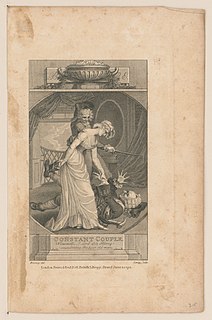 W
WThe Constant Couple is a 1699 play by the Irish writer George Farquhar. It is part of the Restoration comedy tradition, and is often described as a sentimental comedy. It marked the first major success of Farquhar's career. A series of comic misunderstandings are triggered when three rivals vie for the hand of the wealthy heiress Lady Lurewell.
 W
WThe Countess of Salisbury is a 1767 tragedy by Hall Hartson. It is inspired by the 1762 novel Longsword by Irish writer Thomas Leland, who had been Hartson's tutor. It is based on the life of William Longespée, 3rd Earl of Salisbury, son of Henry II of England, and his wife Ela of Salisbury, 3rd Countess of Salisbury.
 W
WThe Country Lasses: or, The Custom of the Manor is a 1715 comedy play by the British writer Charles Johnson.
 W
WThe Deserted Daughter is a 1795 comedy play by the British writer Thomas Holcroft.
 W
WEpitrepontes is an Ancient Greek comedy by Menander, of which only fragments of papyrus were preserved.
 W
WEurope Today is a theatre show produced in cooperation between East West Theatre Company and Slovene National Theatre. The show is based on an essay written by Miroslav Krleza and directed by Haris Pasovic. Production also included Miki Manojlovic, an actor; Edward Clug, a contemporary dancer and choreographer; as well as the industrial, neoclassical band Laibach. The dramaturgy of the production was done by Dubravka Vrgoc, director of Zagreb Youth Theatre. The artists, who reside in Slovenia, Serbia, Bosnia and Herzegovina and Croatia, rehearsed in Maribor's Slovene National Theatre during February 2011. The show opened February 16 and it provoked great regional and international interest.
 W
WEurydice is a 1731 tragedy by the Scottish writer David Mallet. It is one of a number of plays and operas to be based on the story of Eurydice from Greek Mythology.
 W
WThe Fair Circassian is a 1781 tragedy by the British writer Samuel Jackson Pratt. It is an adaptation of the novel Almoran and Hamet by John Hawkesworth. He wrote the lead role for his friend Sarah Siddons, but due to other commitments it ended up being played by Elizabeth Farren.
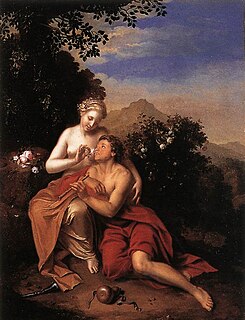 W
W«Granida» — pastoral play written by Pieter Corneliszoon Hooft in 1603-1605 and published in 1615.
 W
WThe Grecian Daughter is a 1772 tragedy by the Irish writer Arthur Murphy.
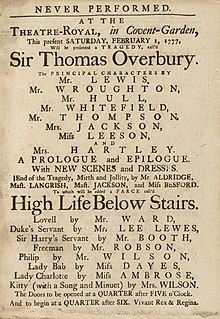 W
WHigh Life Below Stairs is a 1759 comedy play by the British writer James Townley. An afterpiece, it premiered at Drury Lane on a double bill with a revival of Dryden's The Mourning Bride. A popular hit, it was frequently revived.
 W
WThe Humours of Oxford is a 1730 comedy play by the British writer James Miller. It was Miller's debut play, inspired by his time at Wadham College, and proved popular. The plot is set around Oxford University and portrays the academics as overindulging in port wine. William Hogarth designed the frontispiece of the published version of the play.
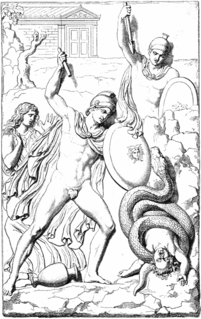 W
WHypsipyle is a partially preserved tragedy by Euripides, about the legend of queen Hypsipyle of Lemnos, daughter of King Thoas. It was one of his last and most elaborate plays. It was performed c. 411–407, along with The Phoenician Women which survives in full, and the lost Antiope.
 W
WThe Ichneutae, also known as the Searchers, Trackers or Tracking Satyrs, is a fragmentary satyr play by the fifth-century BC Athenian dramatist Sophocles. Three nondescript quotations in ancient authors were all that was known of the play until 1912, when the extensive remains of a second-century CE papyrus roll of the Ichneutae were published among the Oxyrhynchus Papyri. With more than four hundred lines surviving in their entirety or in part, the Ichneutae is now the best preserved ancient satyr play after Euripides' Cyclops, the only fully extant example of the genre.
 W
WThe Tragedy of Lady Jane Grey, often shortened to Lady Jane Grey, is a 1715 tragedy by the British writer Nicholas Rowe. It portrays the brief reign of Lady Jane Grey, a pretender to the English throne following the death of Edward VI and her defeat and execution by Mary I in 1554. The title role was played by the prominent actress Anne Oldfield. The cast also included John Mills as the Duke of Northumberland, Barton Booth as Lord Guilford Dudley and Lacy Ryan as the Earl of Sussex, Colley Cibber as Bishop Gardiner, James Quin as the Lieutenant of the Tower and Mary Porter as the Duchess of Suffolk.
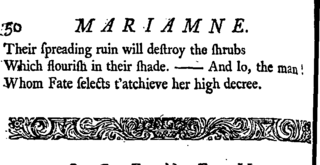 W
WMariamne is a 1723 tragedy play by the British writer Elijah Fenton. It is based on the biblical Mariamne, wife of Herod the Great of Judea. The following year Voltaire produced a French play of the same title.
 W
WLe Miracle de Théophile is a thirteenth-century miracle play written in Langues d'oïl, circa 1261 by the trouvère Rutebeuf.
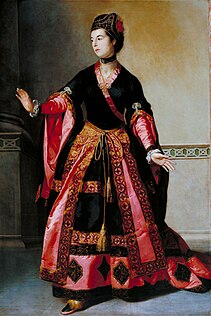 W
WThe Orphan of China is a 1759 tragedy by the Irish writer Arthur Murphy, based on the traditional Chinese play The Orphan of Zhao with the setting moved forwards from the twelfth to the seventeenth century. Although his work, written from 1756, was on a similar topic to Voltaire's play L'Orphelin de la Chine, Murphy asserted that he had written his before he became aware of Voltaire's adaptation. Substantial rewrites took place, including with assistance from Horace Walpole and William Whitehead before Garrick was satisfied and ready to stage it.
 W
WPasquin is a 1736 comedy play by Henry Fielding. It is a satire on both politics and the theatre, with a play within a play plot about a group of actors attempting to put on a production about a local election. It takes its name from Pasquin, a historic statue in Rome.
 W
WPeach Flower Village, also known as Flower Field Mistakes, is a Chinese opera comedy. It is a spin-off of a story in Chapter 5 of the 14th century novel Water Margin, and involves a few Water Margin heroes like Zhou Tong and Lu Zhishen.
 W
WThe Qing Ding Pearl is a Chinese play. It dates to the Song Dynasty and is still performed in adapted forms in the Beijing Opera.
 W
WThe Road to Ruin is a 1792 comedy play by the British writer Thomas Holcroft.
 W
WThe Royal Convert is a 1707 tragedy by the British writer Nicholas Rowe. The play is set in England during the Saxon era featuring two brothers in a love triangle with a young Christian woman.
 W
WShe Would and She Would Not is a 1702 comedy play by the English actor-writer Colley Cibber.
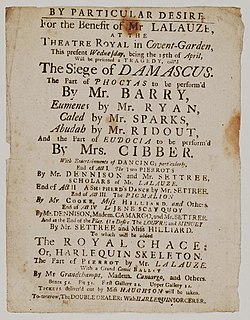 W
WThe Siege of Damascus is a 1720 tragedy by the British writer John Hughes. It was inspired by Simon Ockley's 1708 study Conquest of Syria, and focuses specifically on the Siege of Damascus in 634.
 W
WSir Thomas Overbury is a 1723 tragedy by the British writer Richard Savage. It is based on the life of Thomas Overbury an associate of the Jacobean royal favourite Robert Carr whose apparent murder while incarcerated in the Tower of London provoked a trial and major scandal.
 W
WThe Sister is a 1769 comedy play by the British writer Charlotte Lennox. Premiering at the Covent Garden Theatre, it was based on Lennox's own 1758 novel Henrietta. The original Covent Garden cast included William Powell as Courtney, William Smith as Lord Clairville, Mary Bulkley as Miss Autumn, Sarah Ward as Lady Autumn and John Cushing as Will. However the play was received by a hostile, organised element of the crowd and was withdrawn after one night.
 W
WThe Squire of Alsatia is a 1688 comedy play by the English writer Thomas Shadwell. Alsatia was a nickname for the Whitefriars area of London, deriving from Alsace in northeastern France. A restoration comedy, it was performed at the Drury Lane Theatre by the United Company. One of the best-remembered roles, that of the shrewish Mrs. Termagant was first performed by Elizabeth Boutell. It was revived numerous times during the eighteenth century.
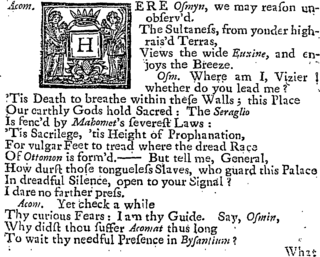 W
WThe Sultaness is a 1717 tragedy by the British writer Charles Johnson. It is a reworking of the 1672 French play Bajazet by Jean Racine set in the Ottoman Empire. In common with early eighteenth century plays it places much greater emphasis on the emotional anguish of its female characters than Racine's original.
 W
WThe Suspicious Husband is a 1747 comedy play by the British writer Benjamin Hoadly.
 W
WTancred and Sigismunda is a 1745 tragedy by the British writer James Thomson. It is inspired by one of the story's from Giovanni Boccaccio's The Decameron.
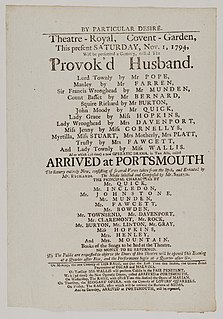 W
WThe Provoked Husband is a 1728 comedy play by the British writer and actor Colley Cibber, based on a fragment of play written by John Vanbrugh. It is also known by the longer title The Provok'd Husband: or, a Journey to London.
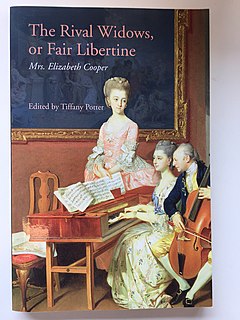 W
WThe Rival Widows, or the Fair Libertine is a 1735 comedy play by the British writer Elizabeth Cooper. The plot is a re-gendered mashup of two popular eighteenth-century genres: the libertine comedy and the comedy of sentiment. The beautiful and brilliant libertine widow Lady Bellair battles the hypocritical friend and rival Lady Lurcher for the attentions of man of feeling Freelove. Bellair loves Freelove, but is exasperated by his rhetoric of feeling and his lack of interest in using witty exchanges or clever plotting to try to seduce her and win her love. In response, she creates various strategems to essentially manipulate him into tricking her into agreeing never to love him, knowing that she will desperately want anything that is forbidden to her. Her character is well summarized early in the play with her own comment that "my pleasures are my principles" and Freelove's summary of her character: "she has wit enough to supply the present dearth of it on the stage, and good nature to make that wit agreeable, even at court. In short, she's gay without levity, libertine without scandal, generous without design, and well-bred without affectation" (1.6). Her comments on marriage convey her recognition that power is at the core of all pleasure for a libertine:
 W
WThe School for Lovers is a 1762 comedy play by the British writer William Whitehead.
 W
WThe Way to Keep Him is a 1760 comedy play by the Irish writer Arthur Murphy. Originally three-acts in length, it premiered at the Drury Lane Theatre in a double bill with Murphy's The Desert Island. Actor-manager David Garrick appeared in both productions. A great success, the following year it was extended to five acts, with music composed by Thomas Arne to accompany it. It had many revivals well into the nineteenth century.
 W
WThe Village Opera is a 1729 ballad opera by the British writer Charles Johnson. It was part of a group of ballad operas produced in the wake of the great success of John Gay's The Beggar's Opera.
 W
WThe Way to Get Married is a 1796 comedy play by the British writer Thomas Morton. The play was frequently revived well into the nineteenth century.
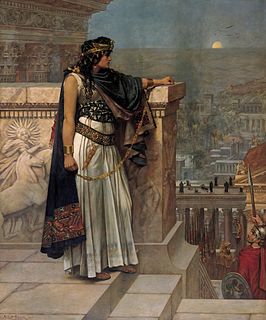 W
WZenobia is a 1768 tragedy by the Irish writer Arthur Murphy. It is based on the life of Zenobia, ruler of the Palmyrene Empire in Syria and her defiance of Ancient Rome.